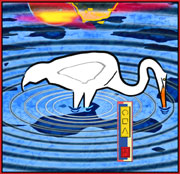On The Way: The Daily Zen Journal
Essential Teachings of Dogen
Dogen (1200-1253)
Buddha ancestors have said since ancient times,
“Living for one hundred years does not compare with living for one day and arousing determination for the way.”
Even when you are uncertain, do not use this one day wastefully. It is a rare treasure to value. Do not compare it with an enormous jewel. Do not compare it with a dragon’s bright pearl.
Old sages valued this one day more than their own living bodies. Reflect on this quietly. A dragon’s pearl may be found. An enormous jewel may be acquired. But this one day out of a hundred years cannot be retrieved once it is lost.
What skillful means can retrieve a day that is passed? No historical documents have recorded such means. Not to waste time is to contain the passage of days and months within your skin bag, without leaking.
Thus sages and wise ones in olden times valued each moment, day, and month more than their own eyeballs or the nation’s land. To waste the passage of time is to be confused and stained in the floating world of name and gain. Not to miss the passage of time is to be in alignment with the way.
Once you have clarity, do not neglect a single day. Wholeheartedly practice for the sake of the way and speak for the sake of the way. We know that buddha ancestors of old did not neglect each day’s endeavor. You should reflect on this every day.
Sit near a bright window and reflect on this, on mellow and flower-filled days. Sit in a plain building and remember it on a solitary rainy evening. Why does the passage of time steal your endeavor?
What kind of enemy is the passage of time? How regrettable to waste your time because of distractions. If you do not know yourself, you will not be able to be your own ally in this great undertaking.
Dogen (1200-1253)
— Excerpted from Enlightenment Unfolds: The Essential Teachings of Zen Master Dogen, by Kazuaki Tanahashi (1999)
Methods of Practice

Sheng-yen (1931- present)
The methods of following the breath and counting the breath were advocated by the Buddha himself in the Sutra on the Awareness of Breathing, and they are still commonly used to concentrate the mind.
In the method of following the breath, do not try to direct the breath in any way. Don’t be distracted by whether the breath is long or short, deep or shallow. Just passively be aware of each breath as it enters your nose.
When your mind is sufficiently calm, you can use the method of counting the breath. Each time you exhale, count one number. Count from one to ten, and then start over at one. Your attention should not be on the breathing itself in the beginning, but on the numbers.
Do not try to suppress your wandering thoughts. If you do, in the beginning it may seem as if you succeed, but as time goes on you will feel uncomfortable and more wandering thoughts will arise.
Ignore the wandering thoughts, and they will gradually subside by themselves. Allow your mind to relax, and each time you notice that it has wandered, simply return to counting your breath. If you don’t desire the pleasant or repulse the unpleasant, your mind will naturally become focused.
Ch’an practitioners should also maintain this attitude in daily life. To become annoyed with difficulties merely adds difficulty to difficulty. Maintain a mind of peace and non opposition, and all tensions will naturally be dissolved.
If you cannot count to ten, it doesn’t matter. Don’t feel disappointed. If you make mistakes in the numbers, don’t feel regretful or anxious. No matter how many mistakes you make, maintain a joyful and relaxed attitude, and go back to starting from one. Be joyful because you are aware that you have made a mistake!
— Excerpted from Subtle Wisdom – Understanding Suffering, Cultivating Compassion through Ch’an Buddhism, by Ch’an Master Sheng-yen




In response to the many who are attempting a life of practice alone, we offer these journals to help guide and steer through the puzzling and confusing times that arise.
There are many places to train, but ultimately the life of practice is one we embark on alone. The meditation sesshin or weekly practice that anyone participates in is only a fraction of how one lives a life of practice.
Who are we through every moment of the day? Is practice something we leave on the cushion, or is it something we have assimilated into daily life?
Steering through Practice with you,
Elana, Scribe for Daily Zen